Tirukural – Chapter 34
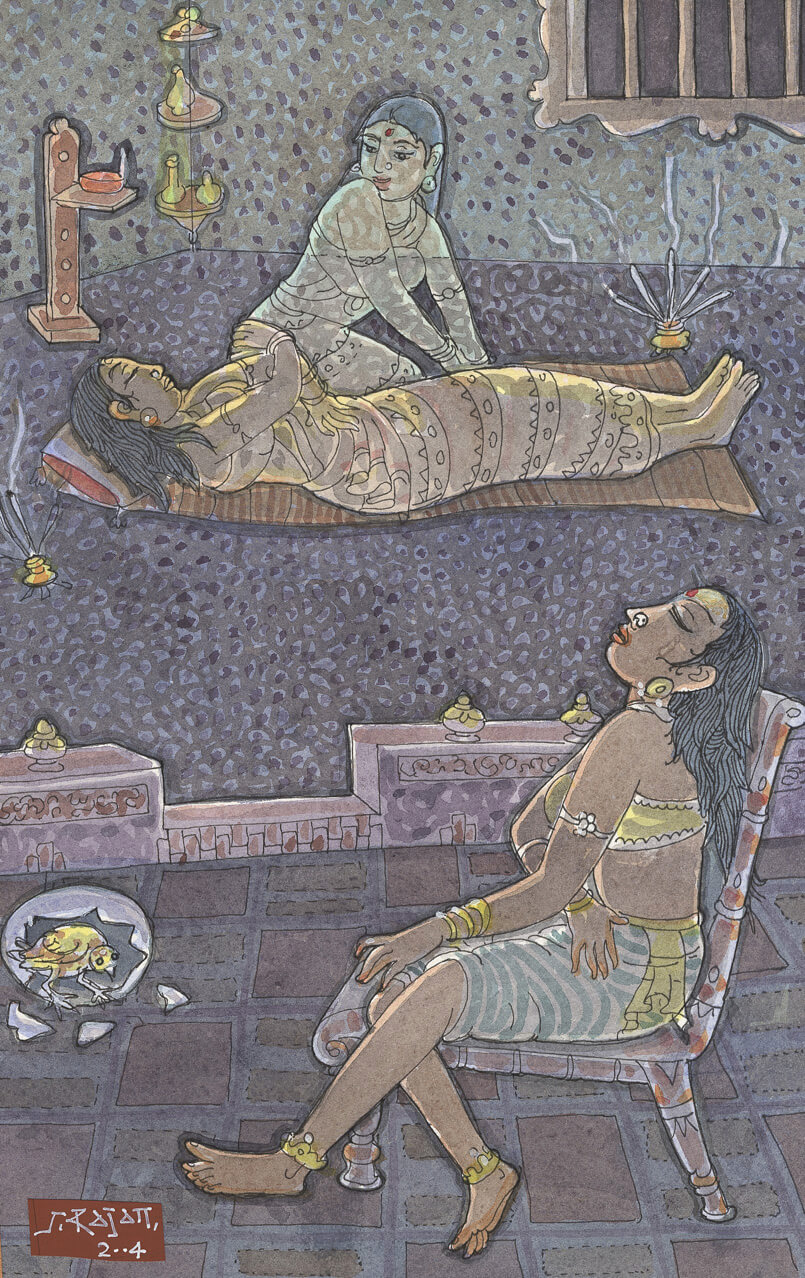
Chapter 34: Impermanence of All Things

Verse 338
A chick breaks out of a shell, leaving it behind as he discovers the world. Nearby a woman meditates on her own attachment to the physical body, a shell which she realizes she will one day leave.
You can access the entire text, in Tamil and English here:
Weaver’s Wisdom
Verse 331
There is no baser folly than the infatuation
that looks upon the ephemeral as if it were everlasting.
Verse 332
Amassing great wealth is gradual, like the gathering of a theater
crowd. Its dispersal is sudden, like that same crowd departing.
Verse 333
Wealth’s nature is to be unenduring.
Upon acquiring it, quickly do that which is enduring.
Verse 334
Though it seems a harmless gauge of time, to those who fathom it,
a day is a saw steadily cutting down the tree of life.
Verse 335
Do good deeds with a sense of urgency,
before death’s approaching rattle strangles the tongue.
Verse 336
What wondrous greatness this world possesses–
that yesterday a man was, and today he is not.
Verse 337
Men do not know if they will live another moment,
yet their thoughts are ten million and more.
Verse 338
The soul’s attachment to the body is like that of a fledgling,
which forsakes its empty shell and flies away.
Verse 339
Death is like falling asleep,
and birth is like waking from that sleep.
Verse 340
Not yet settled in a permanent home,
the soul takes temporary shelter in a body.
Tirukural – Chapter 33
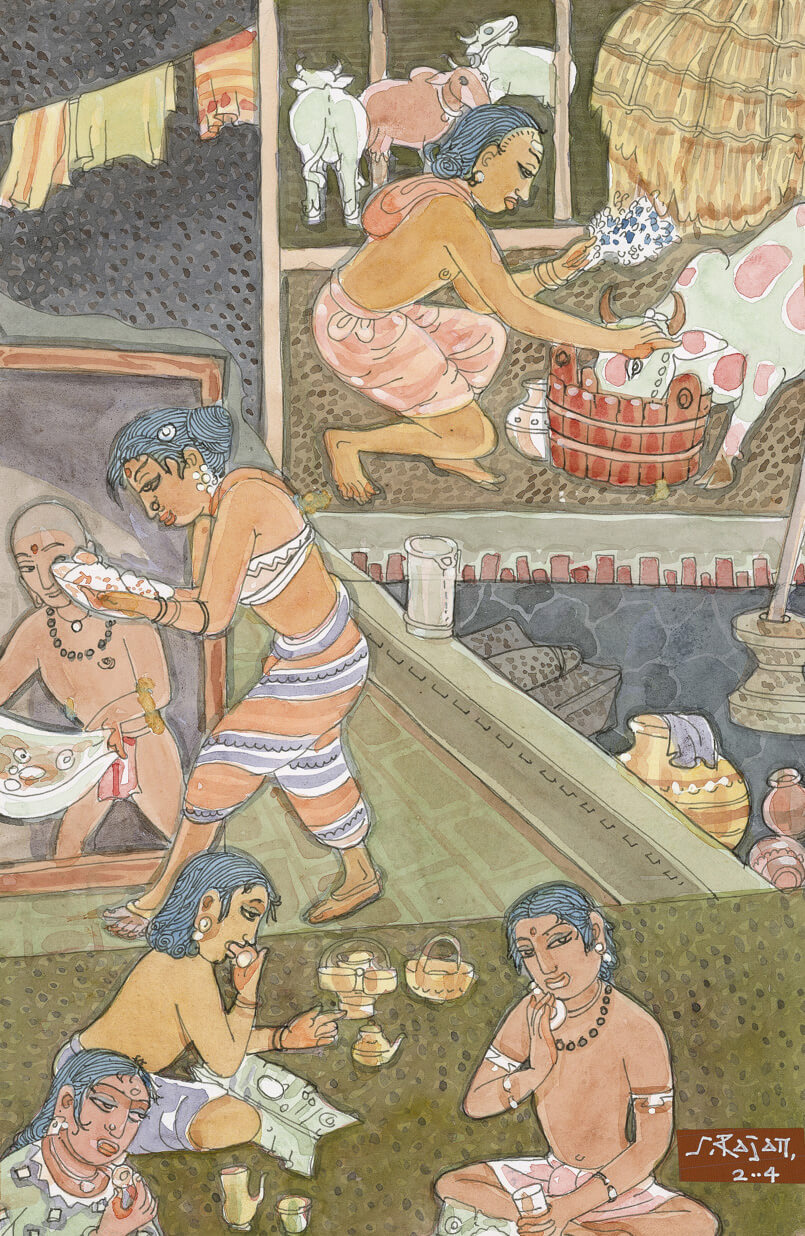
Chapter 33: Avoidance of Killing

Verse 322
Children sit at home for a meal, sharing the food. Behind them, their mother is feeding a poor man who has come to the door. Her husband is caring for and feeding the cows.
You can access the entire text, in Tamil and English here:
Weaver’s Wisdom
Verse 321
What is virtuous conduct? It is never destroying life,
for killing leads to every other sin.
Verse 322
Of all virtues summed by ancient sages, the foremost are to
share one’s food and to protect all living creatures.
Verse 323
Not killing is the first and foremost good.
The virtue of not lying comes next.
Verse 324
What is the good way? It is the path that reflects on
how it may avoid killing any living creature.
Verse 325
Among all who disown the world out of dismay,
the foremost, dismayed with killing, embrace nonkilling.
Verse 326
Life-devouring death will not lay waste the living days
of one whose code of conduct is to never kill.
Verse 327
Refrain from taking precious life from any living being,
even to save your own life.
Verse 328
By sacrifice of life, some gain great wealth and welfare,
but great men scorn such odious gains.
Verse 329
Those whose trade is killing creatures are deemed defiled
by men who know the defiling nature of being mean.
Verse 330
They say that beggars who suffer a depraved life
in a diseased body once deprived another’s body of its life.
Tirukural – Chapter 32
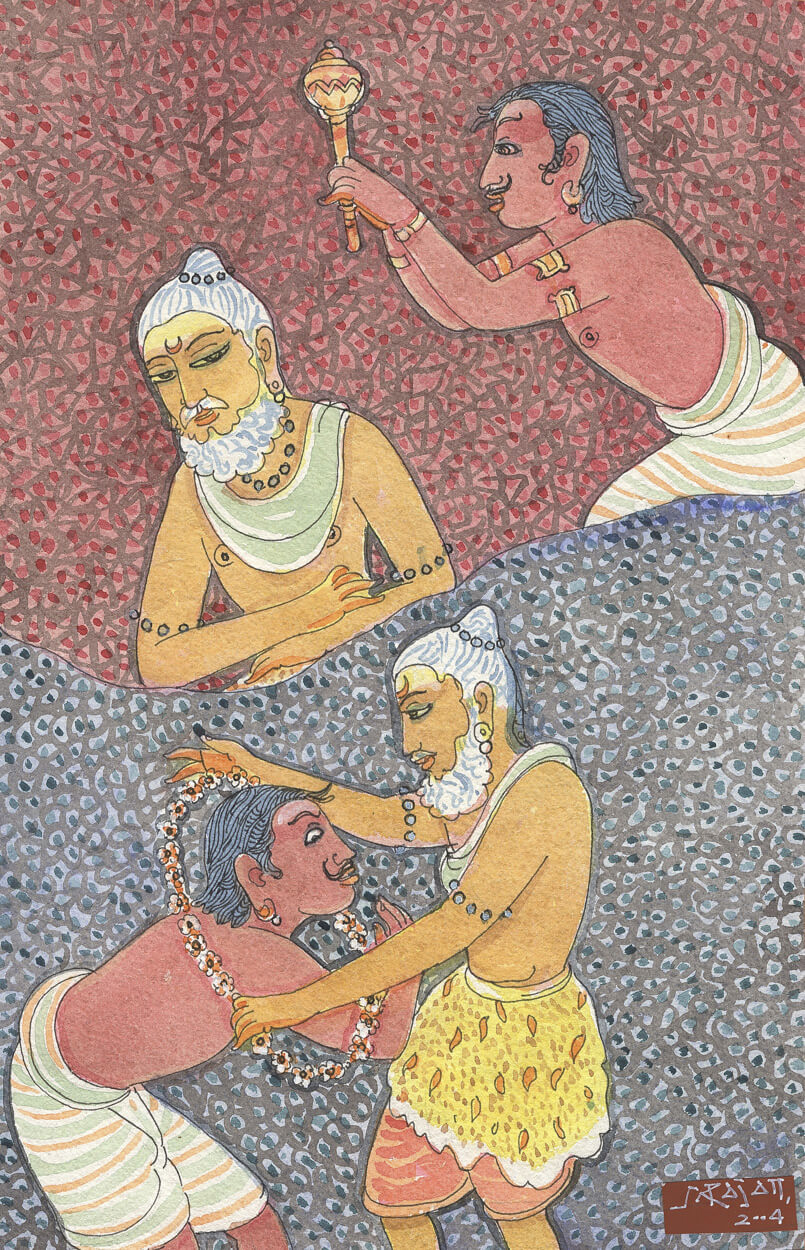
Chapter 32: Avoidance of Injuring Others

Verse 312
Above a man strikes a swami with a club, causing him injury. Later the swami offers a garland, in a gesture of profound forgiveness.
You can access the entire text, in Tamil and English here:
Weaver’s Wisdom
Verse 311
Even if injuring others would bring princely riches,
the pure in heart would still avoid it.
Verse 312
It is the principle of the pure in heart never to injure others,
even when they themselves have been hatefully injured.
Verse 313
Harming others, even enemies who harmed you unprovoked,
surely brings incessant sorrow.
Verse 314
If you return kindness for injuries received and forget both,
Those who harmed you will be punished by their own shame.
Verse 315
What good is a man’s knowledge unless it prompts him
to prevent the pain of others as if it were his own pain?
Verse 316
Actions that are known to harm oneself
should never be inflicted upon others.
Verse 317
The highest principle is this: never knowingly
harm anyone at any time in any way.
Verse 318
Why does he who knows what injury to his own life is like
inflict injury upon other living human beings?
Verse 319
If a man visits sorrow on another in the morning,
sorrow will visit him unbidden in the afternoon.
Verse 320
All suffering recoils on the wrongdoer himself. Thus, those
desiring not to suffer refrain from causing others pain.
Tirukural – Chapter 31
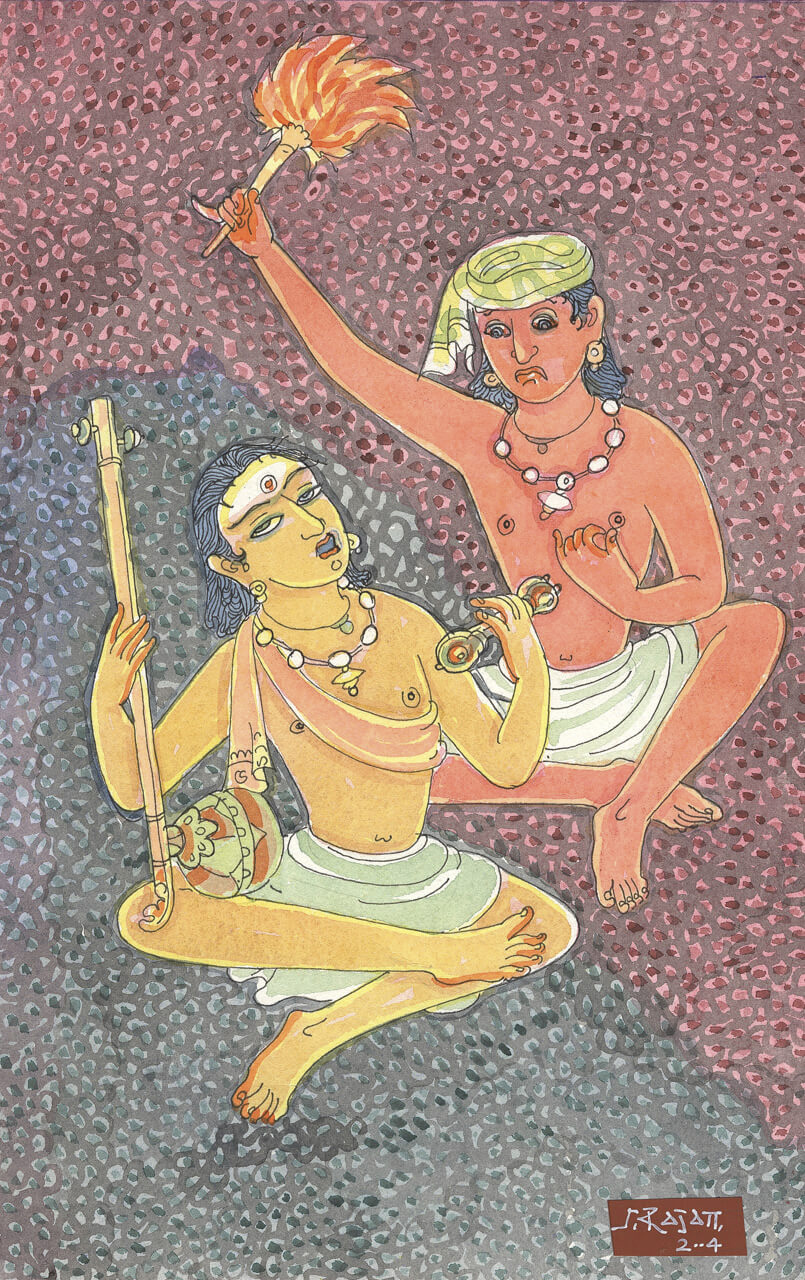
Chapter 31: Avoidance of Anger

Verse 304
On the left a musician is smiling, singing happily for there no anger in his mind. Behind him, with the sad, contorted face made that way by anger, a man holds a fiery torch, which represents the flames of his anger.
You can access the entire text, in Tamil and English here:
Weaver’s Wisdom
Verse 301
It is restraint that restrains rage when it can injure.
If it cannot harm, what does restraint really matter?
Verse 302
Wrath is wrong even when it cannot cause injury,
but when it can, there is nothing more evil.
Verse 303
Forget anger toward all who have offended you,
for it gives rise to teeming troubles.
Verse 304
Anger kills the face’s smile and the heart’s joy.
Does there exist a greater enemy than one’s own anger?
Verse 305
If a man be his own guard, let him guard himself against rage.
Left unguarded, his own wrath will annihilate him.
Verse 306
Anger’s fire engulfs all who draw near it,
burning even friends and family who risk rescue.
Verse 307
As a man trying to strike the ground with his hand can hardly fail,
just as surely will one who treasures his temper be destroyed.
Verse 308
Though others inflict wrongs as painful as flaming torches,
it is good if a man can refrain from inflammatory tantrums.
Verse 309
If hostile thoughts do not invade his mind,
all his other thoughts may swiftly manifest.
Verse 310
As men who have died resemble the dead,
so men who have renounced rage resemble renunciates.
Tirukural – Chapter 30
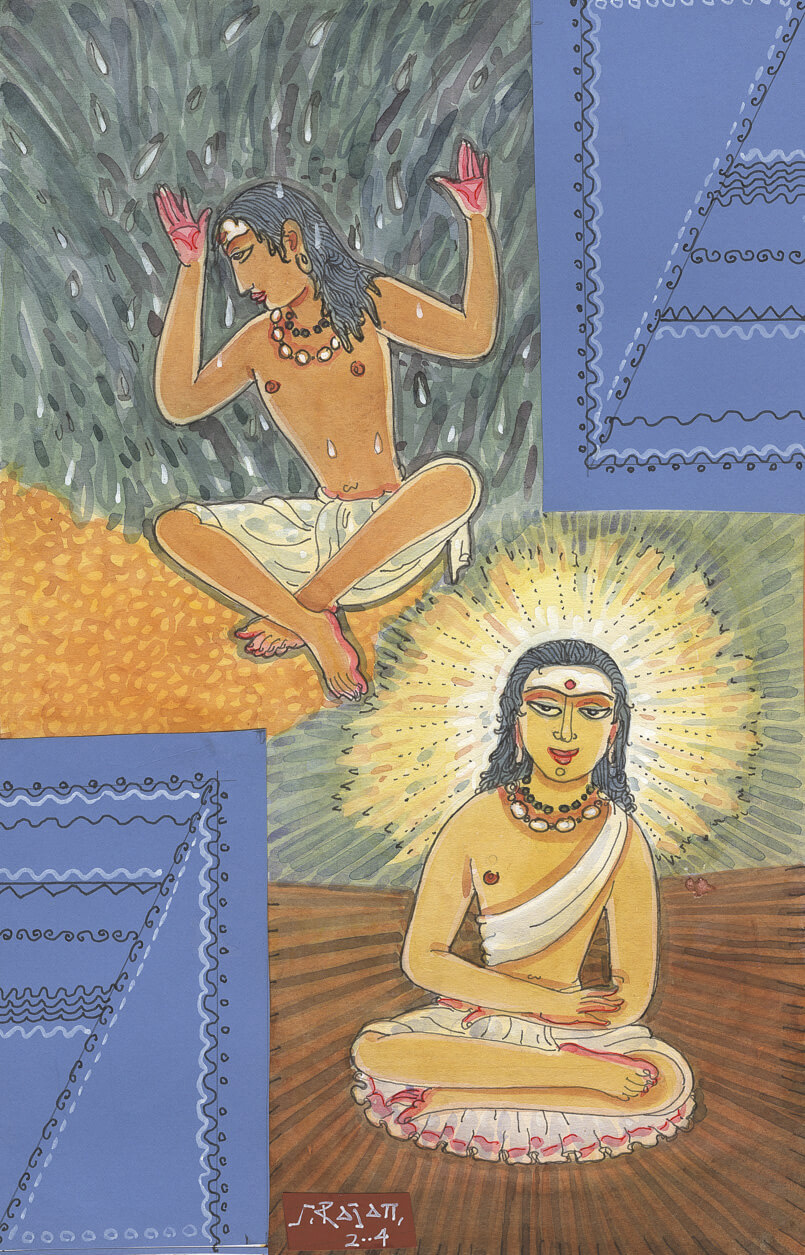
Chapter 30: Truthfulness

Verse 298
A stream of water pours on a person as he bathes his body. A stream of golden light bathes a man of truth.
You can access the entire text, in Tamil and English here:
Weaver’s Wisdom
Verse 291
What is truthfulness? It is speaking words
which are totally free from harmful effects.
Verse 292
Even falsehood is of the nature of truth
if it renders good results, free from fault.
Verse 293
Let one not speak as true what he knows to be false,
for his conscience will burn him when he has lied.
Verse 294
One who lives by truth in his own heart
truly lives in the hearts of all people.
Verse 295
Those who speak only truth from the heart
surpass even penitents and philanthropists.
Verse 296
No prestige surpasses the absence of falsehood;
all other virtues flow from it effortlessly.
Verse 297
Not lying, and merely not lying, is beneficial
for those who cannot or will not practice other virtues.
Verse 298
Water is sufficient to cleanse the body,
but truthfulness alone can purify the mind.
Verse 299
Not all lamps give light.
The lamp of not-lying is the learned man’s light.
Verse 300
Among all great truths we have ever beheld,
not a single one rivals the goodness of telling the truth.
Tirukural – Chapter 29
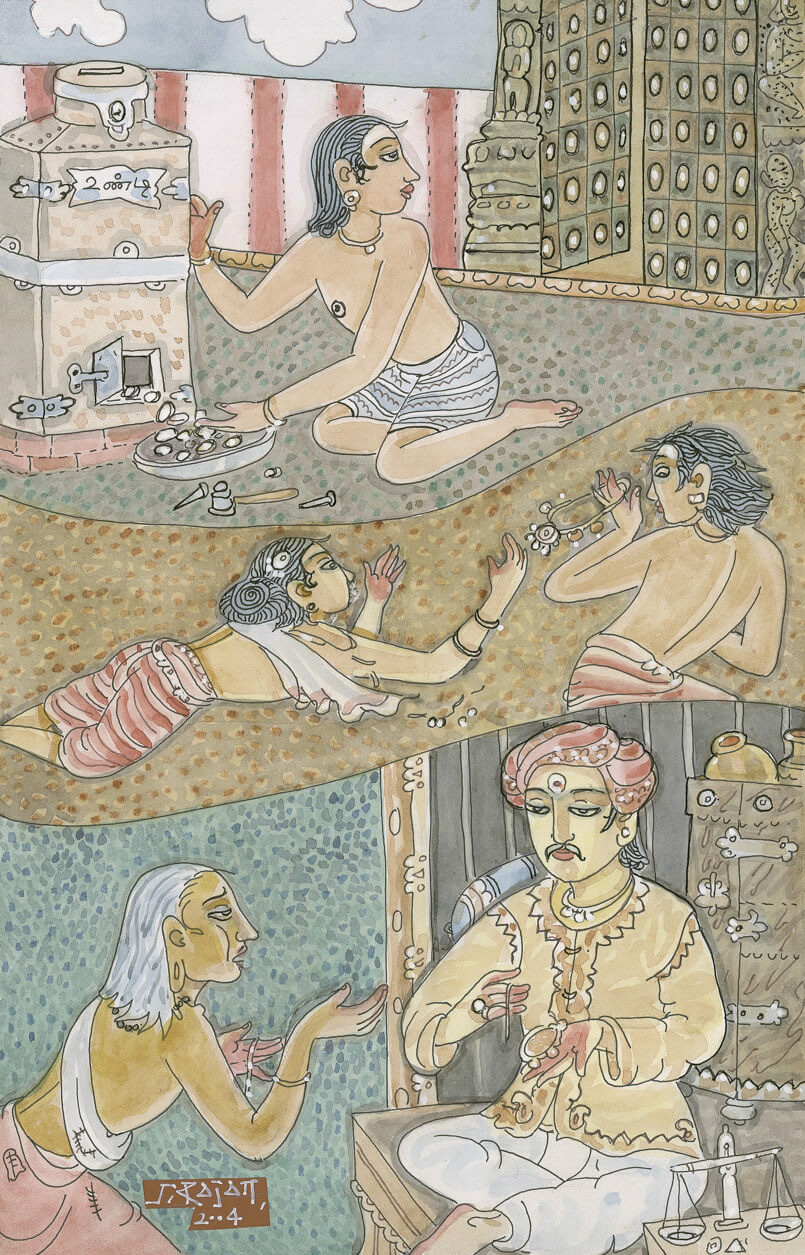
Chapter 29: Avoidance of Fraud

Verse 284
Here we see various forms of stealing. A teenager breaks into the temple lockbox, another snatches jewelry from a hapless woman and a third, the owner of a pawnshop, is cheating an old woman of her jewelry’s true value.
You can access the entire text, in Tamil and English here:
Weaver’s Wisdom
Verse 281
He who wishes not to be scorned by others
guards his own mind against the slightest thought of fraud.
Verse 282
The mere thought of sin is sin. Therefore,
avoid even the thought of stealing from another.
Verse 283
A fortune amassed by fraud may appear to prosper
but will all too soon perish altogether.
Verse 284
Taking delight in defrauding others yields the fruit
of undying suffering when those delights ripen.
Verse 285
Benevolent thoughts and kindly feelings flee from those
who watch for another’s unwatchfulness to swindle his property.
Verse 286
Those who walk deceit’s desirous path
cannot hope to work wisdom’s measured way.
Verse 287
The dark deceits of fraud cannot be found
in those who desire the greatness called virtue.
Verse 288
As righteousness resides in the hearts of the virtuous,
so does deceit dwell in the hearts of thieves.
Verse 289
Men who know nothing but deception die a little
each time they contrive their crooked deeds.
Verse 290
Even the life in his body will abandon him who cheats others,
while Heaven itself never forsakes those who are honest.
Tirukural – Chapter 28
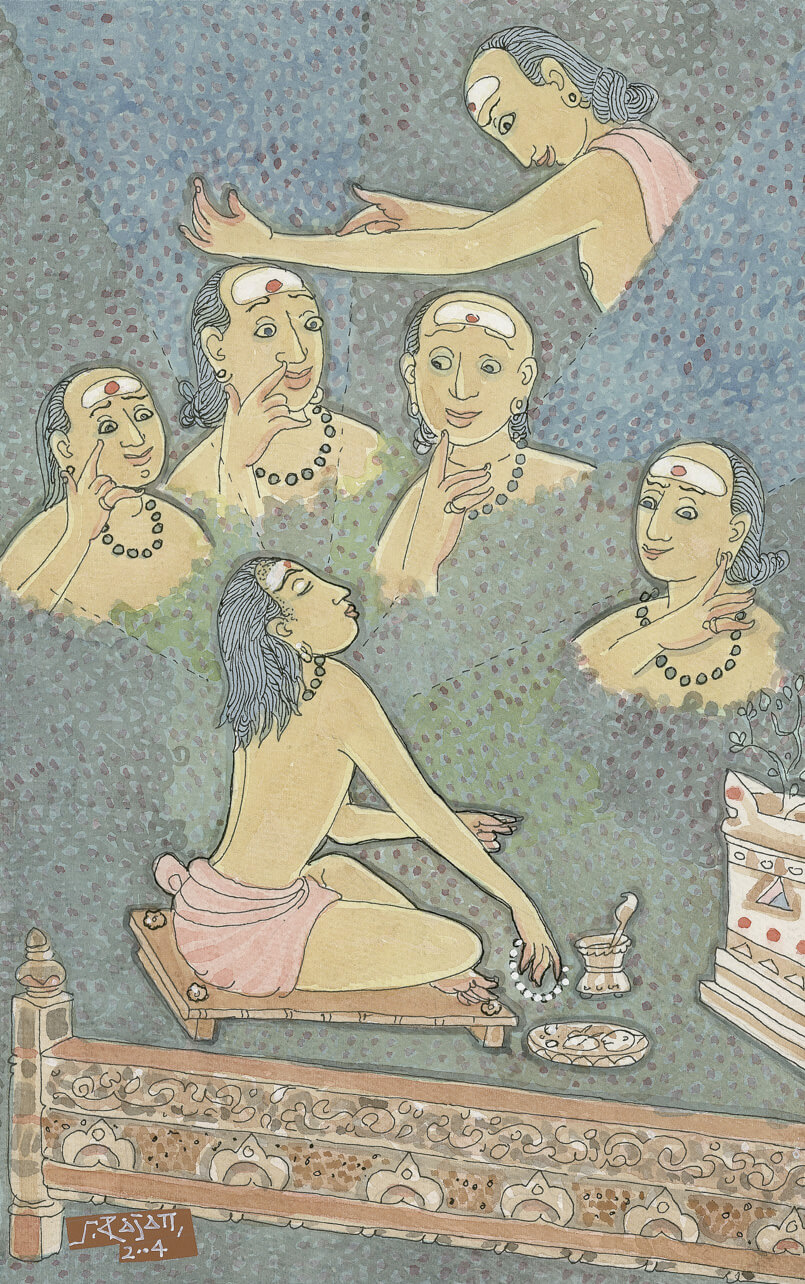
Chapter 28: Deceptive Conduct

Verse 271
A man sits in deep meditation, clearly controlling his senses, which are shown behind him in personified form: the eyes, nose, mouth, ears and sense of touch.
You can access the entire text, in Tamil and English here:
Weaver’s Wisdom
Verse 271
A deceiver’s own five elements remain undeceived
by his double-dealing mind and silently mock him.
Verse 272
Of what avail is an outer appearance of saintliness
if the mind suffers inwardly from knowledge of its iniquity?
Verse 273
He who has not attained the power yet wears the garb of saints
is like a cow that grazes about wearing a tiger’s skin.
Verse 274
He who conceals himself beneath holy robes and commits sins
is like a hunter hiding in the bushes to snare unwary birds.
Verse 275
The day will come when those who claim dispassion
yet act deceitfully exclaim,”Alas! Alas! What have I done?”
Verse 276
None is so heartless as he who, without renunciation in his heart,
poses as a renunciate and lives in pretense.
Verse 277
Like the poisonous jequirity bean, with its red and black sides,
there are outwardly dazzling men whose insides are dark.
Verse 278
Many are the men who piously bathe in purifying waters,
while in their black hearts impure conduct lies concealed.
Verse 279
The arrow is straight but cruel; the lute is crooked but sweet.
Therefore, judge men by their acts, not their appearance.
Verse 280
Neither shaven head nor long matted locks are needed,
provided one casts off conduct condemned by the world.
Monks Making Code for the Interwebs

Aum Namah Sivaya
Today we take you into the digital world of two of our monks in the Ganapati Kulam's Media Studio. Sannyasin Brahmanathaswami has been hard at work on several fronts. Each week he edits the audio for Satguru's talks and, after they are transcribed by a sevak on the big island, Swami puts them up on the monastery's website. Swami is also working on a new in-house release of the file version control app that our team uses for creating and editing Hinduism Today magazine. This afternoon Swami has been making improvements to the audio functionality of the SivaSiva app. On other fronts, Yogi Jayanatha has been gradually working to rebuild the Hinduism Today website, which is now near completion. Aum.
Tirukural – Chapter 27
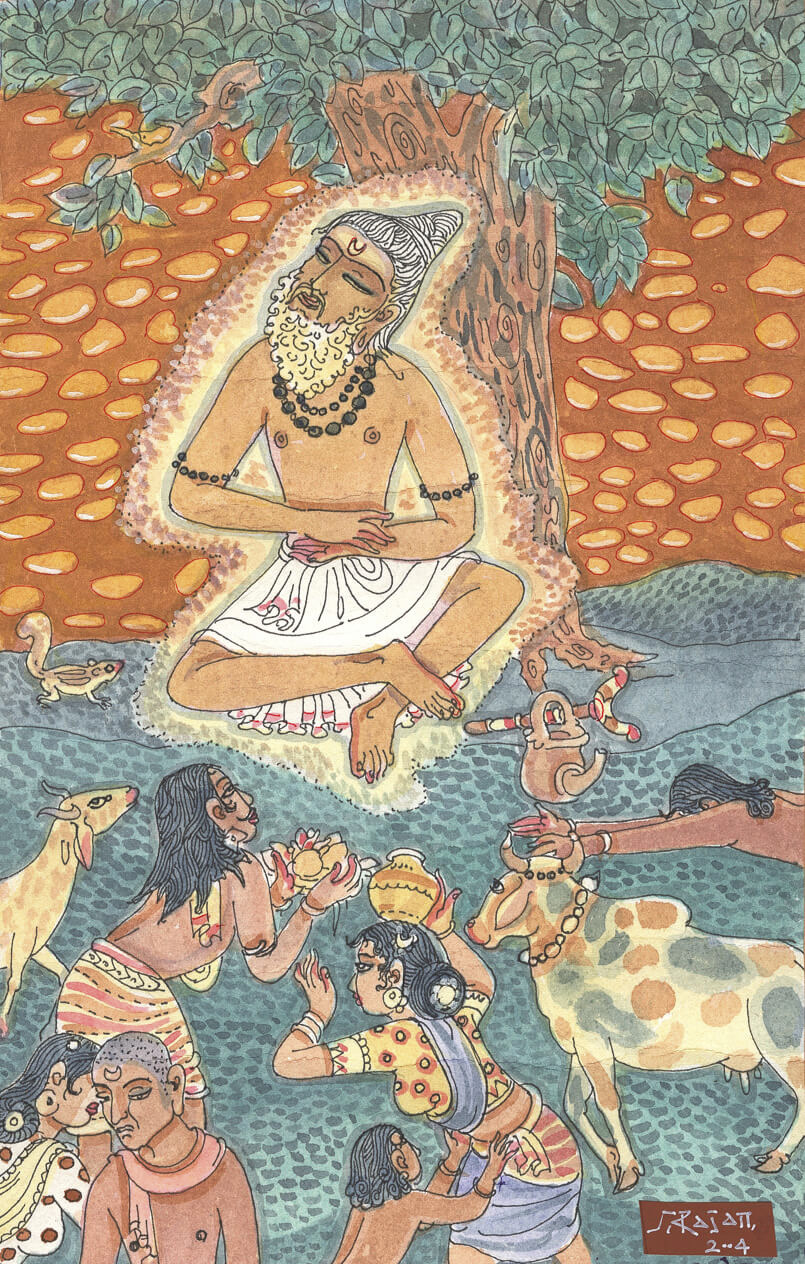
Chapter 27: Austerity

Verse 268
An illumined yogi sits under a tree, filled with the light of his realizations. Seeing his peace, people and animals come for his blessings and darshan.
You can access the entire text, in Tamil and English here:
Weaver's Wisdom
Verse 261
It is the nature of asceticism to patiently endure hardship
and to not harm living creatures.
Verse 262
Austerity belongs to the naturally austere.
Others may attempt it, but to no avail.
Verse 263
Is it because they must provide for renunciates
that others forget to perform penance?
Verse 264
Should he but wish it, an ascetic's austerities
will ruin his foes and reward his friends.
Verse 265
In this world men do austerities diligently,
assured of acquiring desires they desire.
Verse 266
Men who follow some austerity fulfill their karma.
All others, ensnared in desires, act in vain.
Verse 267
As the intense fire of the furnace refines gold to brilliance, so does
the burning suffering of austerity purify the soul to resplendence.
Verse 268
One who has realized by himself his soul's Self
will be worshiped by all other souls.
Verse 269
So potent is the power acquired through disciplined self-denial
that those who attain it may even delay the moment of death.
Verse 270
A few people fast and abstain, while most do not.
Due to this, many suffer deprivation.
Tirukural – Chapter 26
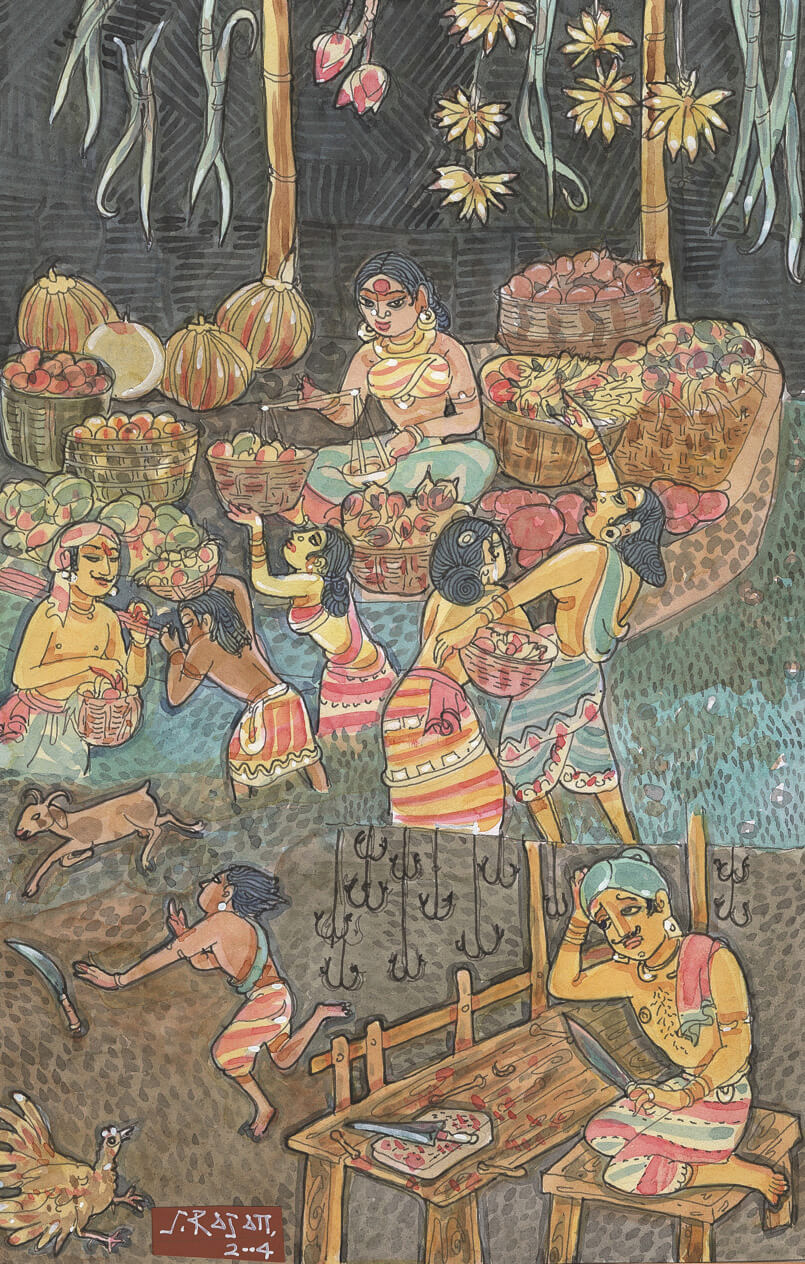
Chapter 26: Abstaining from Eating Meat

Verse 256
A butcher holds his hand on his head, dejected that his shop is empty. His helper tosses aside the killing knife and runs away, setting the chickens and goats free. He is drawn to the opposite shop, a vegetarian store where the crowds are abundant and lots of fresh vegetables are available.
You can access the entire text, in Tamil and English here:
Weaver's Wisdom
Verse 251
How can he practice true compassion
who eats the flesh of an animal to fatten his own flesh?
Verse 252
Riches cannot be found in the hands of the thriftless,
nor can compassion be found in the hearts of those who eat meat.
Verse 253
He who feasts on a creature's flesh is like he who wields a weapon.
Goodness is never one with the minds of these two.
Verse 254
If you ask, "What is kindness and what is unkindness?"
It is not-killing and killing. Thus, eating flesh is never virtuous.
Verse 255
Life is perpetuated by not eating meat.
The jaws of Hell close on those who do.
Verse 256
If the world did not purchase and consume meat,
no one would slaughter and offer meat for sale.
Verse 257
When a man realizes that meat is the butchered flesh
of another creature, he will abstain from eating it.
Verse 258
Insightful souls who have abandoned the passion to hurt others
will not feed on flesh that life has abandoned.
Verse 259
Greater than a thousand ghee offerings consumed in sacrificial
fires is to not sacrifice and consume any living creature.
Verse 260
All life will press palms together in prayerful adoration
of those who refuse to slaughter or savor meat.
From Our Gurus' Teachings
Archives are now available through 2001. Light colored days have no posts. 1998-2001 coming later.
